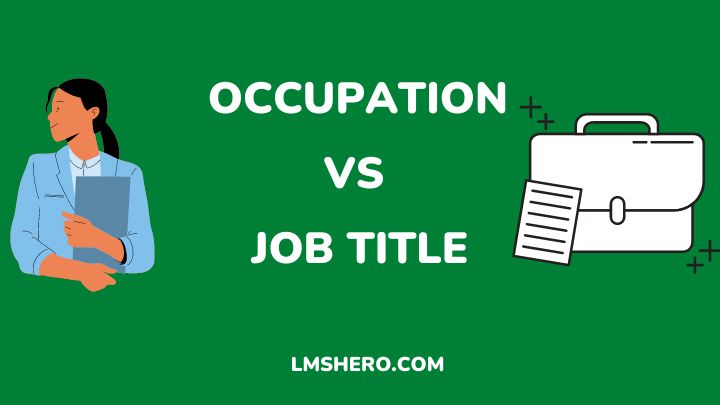Occupation and job title are terms used to define an employee’s position in an organization. While many professionals use them interchangeably, there are significant differences between the two.
And understanding the differences between these terms will help you refine your job search, and make a better career choice.
This article explains the key differences between occupation and job title, and why they are two different, yet important pieces when deciding on a career.
Read on to learn more.
What is a job title?

A job title is a specific term given to a position or employment.
It represents the job hierarchy of an organization, which influences career trajectories, as well as the progression from one position to another.
What is an occupation?
Occupation refers to a wide term for any task performed in exchange for a wage.
It is a neutral and inclusive term that can be used to describe a variety of jobs, such as engineer, physician, educator, laborer, nurse, etc.
Occupation vs Job title: What are the differences?
A job title, such as a podiatrist, marketer, data analyst, etc refers to a specific profession or position that an individual serves, while an occupation refers to a broader title or the entire industry in which a person works, such as a doctor, nurse, etc.
However, some people can have the same occupation without having the same job title. For instance, “teacher” is a profession, but there are other types of teachers, such as special education teachers, mathematics teachers, homeroom teachers, and so on.
Occupation and job title are terms often used in the same context to connote similar meanings, but they are significantly different. Here are some differences between job titles and occupations:
1. Specificity
Even though an occupation is a more general description of what a person does for a livelihood and a job title is a bit more detailed, job titles vary in their level of specificity.
For instance, someone who writes news may characterize themselves as a journalist and their job title as an editor.
However, there are also various types of editors, such as editor-in-chief, managing editor, fact-checker, etc., which can make the job title more specific.
So, if you are just beginning your job hunt and are open to a wide variety of positions that match your qualifications, you should search by occupation, and if you want to be more specific, you can also search job title, such as “editor.”
Or you can use the exact job title you want, such as “managing editor,” for a well-tailored search. Providing as much detail as possible enables you to locate employment that matches your interests and qualifications.
2. Rank
Another distinction between occupation and job title is that a job title can give insight into your hierarchical position in the workplace.
For instance, a person’s occupation may be “lecturer,” while his or her job title is “Lecturer I” or “Lecturer II.” And the purpose of this is to determine the seniority level of every employee in the organization.
Furthermore, a person’s job title may be “junior data analyst ” or “senior data analyst” based on their position in the organizational hierarchy, but their occupation still remains “data analyst.”
3. Salary ranges
Similarly to how a person’s job title provides a wide description of what they do for a livelihood, it also provides a broad compensation range.
For instance, if you search for the wage range for a software developer, you will likely receive a broader range than if you look for a senior software developer.
When researching average salaries prior to the negotiation phase of the hiring process, you should reduce the job title as much as possible. This will provide you with a more accurate salary figure that can help you negotiate better.
Finally, do not forget that your compensation also depends on the location of your job and the company for which you work. So, these factors can affect the salary range for occupations and job titles.
4. Daily responsibilities
Unlike occupation, job titles frequently provide detailed information about the tasks you would do regularly.
For example, a search for “store associate” may reveal a wide array of tasks, while a search for “cashier” or “stocker” may bring more precise results.
So, job titles are beneficial when a job description does not include duties or tasks. Hence, before applying for such jobs, you should research similar job listings and search results to determine if the tasks are what you can do.
5. Government approval
If you are seeking samples of work titles to extend your job search but do not know where to start, there are a variety of official sources that list all government-defined jobs.
The Dictionary of Occupational Titles, or DOT, for example, is a magazine created by the United States Department of Labor that subdivides lists of occupations as opposed to job titles. Here are they:
- Management
- Financial and Business Operations
- Computer and Mathematics
- Construction and Engineering
- Biology, physics, and sociology
- Social and Community Service
- Legal
- Instructional Curriculum and Library
- Arts, Fashion, Recreation, and Media
- Practitioners of Healthcare and Technical
- Healthcare Assistants
- Security Service
- Related to Food Preparation and Serving
- Exterior and Interior Cleaning and Maintenance
- Personal Service and Attention
- Marketing and Related
- Office Administration and Support
- Agriculture, fishing, and forestry
- Development and Extraction
- Building, Service, and Maintenance
- Production
- Transport and Material Transfer
- Military
FAQs
Is there a difference between occupation and profession?
Yes, occupation refers to tasks performed by any person to earn a living. A profession is an occupation that requires a college degree or expertise in a specific discipline.
What is the difference between occupation and vocation?
The difference between them is that vocation is more about using one’s skills and talents to make the world a better place, while occupation is mainly concerned with making money.
Conclusion: Occupation and Job title
Occupation and job title are two common terms often used interchangeably in the corporate world, however different.
A job title is an appellation that describes one’s position or employment. Job titles are more descriptive because they indicate the job’s level as well as the tasks that come with it. While occupation is a broad term for any task performed in exchange for a salary.
In recent years, however, some organizations have also begun using fancy job titles for popular occupations, making it a bit hard to tell the difference.
However, these job titles barely provide information about the occupation, and it would be difficult to determine the responsibilities based on the job title alone. So, you should always check for similar jobs to see if the responsibilities are within your skill set.
I hope you enjoyed reading this. You can also read to know some job ideas for someone who doesn’t know what to do.
Thanks for reading.







